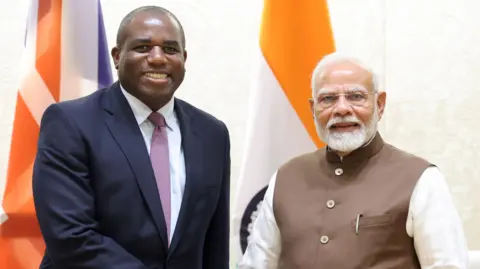David Lammy aims to reset UK-India ties with early trip

 @narendramodi
@narendramodiIndia can be tricky territory for Labour.
Prime Minister Clement Attlee was criticised for allowing partition to be rushed at terrible cost in human life.
Foreign Secretary Robin Cook caused a storm by offering to mediate between India and Pakistan over Kashmir.
And the party led by Jeremy Corbyn angered even more here when it passed a motion calling for international intervention in the disputed region.
So it must have been with some trepidation that David Lammy arrived in a warm and damp New Delhi on Wednesday morning, a newly-minted foreign secretary stepping away for the first time from the more familiar turf of Europe and the United States.
His trip oozed caution. The announcements were uncontroversial; both countries agreed a new tech security partnership.
His words in interviews were safe and measured, eulogising India as a “superpower” and “indispensable partner”.
Mr Lammy’s programme even included a tree planting ceremony at the British residence. Radical this was not.
Yet the nature of the trip was less important than the sheer fact of it.
This was a British foreign secretary in a new government, making a point of visiting India in his third week in office.
Mr Lammy held talks with his Indian counterpart Subrahmanyam Jaishankar.
More than that, he also secured a prized meeting with Prime Minister Narendra Modi, a head of government who rarely deigns to trouble himself with mere foreign ministers.
And all this while Mr Modi’s new coalition government was busy dealing with the fallout from its first budget.
Trade deal talks
In other words, this was a meeting both sides wanted and were prepared to make time for.
For Labour, the primary focus was trade. If it wants the UK’s economy to grow, then it will need British firms to do more business with Indian partners.
India’s economy is on course to become the world’s third largest by the end of the decade. Yet it is only the UK’s 12th largest trading partner.
“There is so much we can do with this global superpower,” Mr Lammy told me.
“We have a long-standing history, a longstanding relationship, and it is a win-win for both of our economies.”
He said Britain would work with India to agree a new free trade deal “in the coming months”, negotiations that have been stalled for much of the year as both countries held elections.
“Being here in India is essential. We have shared interest with India. It is a growing economy. It is going to be the third largest by the end of this decade. It is hugely important that we deepen and grow our ties.”
But this trip was not just about economics. There was broader geopolitics too.
Mr Lammy wants to reset Britain’s relations with the so-called Global South. India sees itself as key player in this loose group of developing nations.
And that, Mr Lammy says, involves less lecturing by Britain and more listening.
He was keen to talk about shared interests on green technology and shared threats in the Indo-Pacific, namely China.
He was less keen to talk about his hosts subsidising Russia’s war machine in Ukraine by buying many tanker loads of cheap Russian oil and gas.
“Across the democratic community, there will always be differences of opinion,” he averred. Which is one way of excusing an ally for aiding an enemy.
‘Underperforming’
The subtext to all this – implicit rather than explicit – was that with so much political instability among Britain’s traditional allies on both sides of the Atlantic, the government was keen to revive and reset – to use Mr Lammy’s favoured phrase – its relations with other allies. And India is the biggest prize.
He said Britain’s relationship with India had been “underperforming” but both countries’ interests were aligned on many issues. He said the UK must cooperate with India “in this tough, geopolitically-challenging time”.
For Indian ministers, Mr Lammy’s trip was seen as good moment to invest in a British government that may be in power for some time.
It was also a chance to refocus the UK on the possibility of a trade deal between the two countries – which India hopes would force the UK to relax its visa regime for Indian students and business professionals.
They clearly welcomed the fact Mr Lammy had made an early visit, and had brought a plane-load of tech entrepreneurs with him.
Away from the economics, there was also some unstated politics.
India has just lost in Rishi Sunak a British prime minister of Asian origin with close family links to the country.
Labour was aware of that, and wanted to fill the gap quickly.
The Jeremy Corbyn era is also still fresh is some Indian minds, and Mr Lammy’s early trip will come as some reassurance.
This trip to the subcontinent was hot and humid. Mr Lammy’s suit was too dark and thick. But the great-grandson of a lady from Calcutta will probably think it was worth the sweat in diplomatic gain.
Source link




